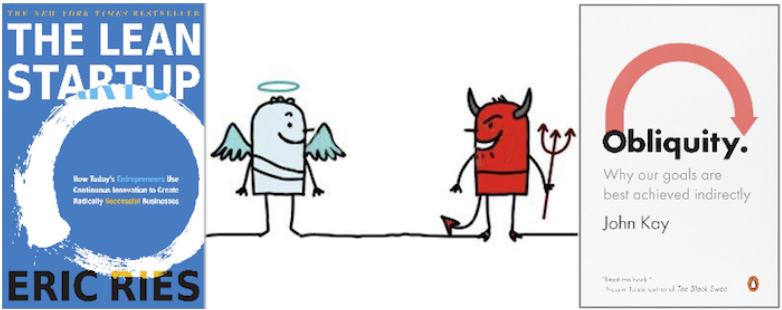
Lean Startups are easy!
But what does Obliquity mean?
The lean startup movement has become a victim of its own success. Lean implies lightweight, and that's a disservice to the methodology.
Lean has a welcoming, come-one-come-all ethic. But there's a downside, as James Surowiecki highlights: "Though we may be seeing a “Cambrian explosion” of new companies...there’s a mass extinction going on, too."
Sadly, none of this is a reflection on the actual lean methodology. It's a reflection on the term, lean, and how it grossly misrepresents the skills and effort needed to succeed.
Lean sounds easy
I used to manage a product for product developers, giving me frequent opportunities to meet with people considering a new venture. Lean dominated our discussions: "We're taking a lean approach. We're being agile. We're pivoting. We're going to launch our MVP and go from there."
The actual experience of a startup is far from easy. One of Paul Graham's counterintuitive revelations is that "startups are all-consuming. If you start a startup, it will take over your life to a degree you cannot imagine."
I worry that many entrepreneurs are falling into the chasm between the allure of the lean startup and the daunting complexity of a new venture.
As entrepreneurs, we need to reframe Lean in more realistic terms.
Obliquity is hard
Obliquity: Why our goals are best achieved indirectly is a book by economist John Kay.
Kay's arguments have much in common with the lean movement. He argues that activities like launching a new venture are far too complex to be planned directly. Instead, they must be pursued indirectly, or obliquely, for the winning solution to be discovered.
Where Obliquity differs is in its description of the tactics needed for success. It begins with the choice of the word, Obliquity. It's graduate level; it doesn't make empty promises about ease of use or accessibility.
Kay goes on to summarize the behaviours of the oblique decision maker in similarly challenging terms:
Intentionality: Outcomes arise through complex processes whose totality no one fully grasps.
Limited comparison: Actions are chosen from a constricted subset of options by successive limited comparison.
Information: Decisions are made after recognizing that only limited knowledge of the world is or can be available.
Eclecticism: Good decision making is eclectic in its use of models, narratives, and sources of evidence.
Adaptation: Good outcomes are derived through continual (but often unsuccessful) adaptation to constantly changing circumstances.
Expertise: The expert can do things that others can't—and can only rarely learn.
Direction: Order often emerges spontaneously.
Consistency: Consistency is a minor, and possibly dangerous, virtue.
Process rationality: Good decisions are the outcome of good judgment.
Advocates of the lean movement may recognize their behaviours in these statements. But in simplifying the concepts to make them sticky, we need to avoid dumbing them down beyond recognition.
In Kay's world, startups are hard because entrepreneurs need to confront obliquity. It's an honest reflection of entrepreneurship and it fattens up the Lean Startup considerably.
